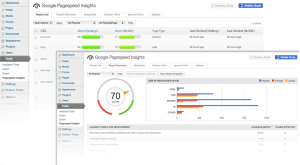Whether you’re a full-blown web developer or have just begun dabbling in the world of WordPress, you probably already have heard about or are familiar with the importance of plugins. Plugins integrate seamlessly and make having a WordPress site that much easier. They allow us to bypass complicated coding and we can turn them on and off with one simple click. WordPress websites would become more of a hassle for the majority of us if Plugins didn’t exist. WordPress without plugins are like Pizza without toppings…kind of well, plain and boring (sorry cheese-only lovers).
More recently, the topic of website performance and the number of plugins installed on websites have spread online. I’ve noticed and come across various online forums where people worry about having too many plugins installed and question if it’s affecting their website performance. I’ve seen some so-called experts say that the sweet spot is about 25-30 plugins while others claim they’ve seen no performance issues with up to 100 or more plugins installed. The reality is that there are various factors that play a role in running your WordPress website like a well-oiled machine.

Technically speaking, WordPress was designed to handle a ton of your plugins without slowing down your website. That being said, too much of anything can be bad, as in any facet of life. This is especially true when you’re not taking the following factors into consideration with respect to your WordPress plugins:
Quality of Plugins
If you had a Ferrari, odds are that you’re not going to pump 87 octane gas into it right? You’d be sure to get a funny look at the gas station. Treat your WordPress website the same way. ‘Fill her up’ with high-quality plugins and your website will be better optimized, not to mention your audience will appreciate a smoother user experience in return. How can you verify the overall quality and performance of your WordPress website? The Google PageSpeed Insights plugin can help get you started.
Also, the number of unnecessary plugins can make a difference. This should go without saying but if you have plugins that exist just for the sake of existing, you’ll want to consider doing some housecleaning. Only install plugins that you’re actually going to use, and do not leave them deactivated but instead, deleted. This will save you time and ensure efficiency in the long run.
Your Hosting Matters
Your hosting service matters. Bottom line. The difference between a great and satisfactory host is like the difference between a great landlord that tends to your needs and one that ignores them. We’ve all experience that landlord that ignored our request to fix the bathroom sink or upgrade the appliances. It’s not fun, to say the least. Whether you’re just starting a new website or are a seasoned business owner, you’ll need a host that caters to your specific needs. If you’re an e-commerce business or simply have a lot of data on your website, for example, you’ll want to compare disk space offering as well as speed (loading time) and a dedicated customer support team. Keep in mind that a slow host doesn’t just affect the speed of your customer’s website experience but can also make things on the admin side function sluggishly. All too often, business owners have had that dreadful day where their website suddenly goes down due to a higher number of visitors and/or unusual activity. If you’re looking to get started with a new host or ditch your current one, explore Host Duplex’s Managed WordPress offering here and feel free to give us a call if you have any questions.
Use A CDN
A CDN or ‘Content Delivery Network’ takes your website’s content and distributes it on to various places (servers) from a single location. Having a CDN can help improve the importance and scalability your content. If your website is hosted at one primary location and you get a sudden surge of traffic, it could spell doom without a CDN. A CDN will have a huge positive impact especially if you have website users around the world. Depending on the distance from the website user and the hosted server, it could take a longer time to deliver and upload data without a Content Delivery Network. In short, these are some of the main reasons why many companies have invested in a quality CDN provider.
If you’re not already implementing the above suggestions, give them a shot and see how your website performance can improve today! Your clients just might thank you.



What You Need To Know About WordPress Plugins and Website Performance